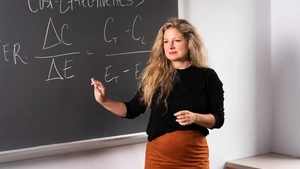“I went to Penn GSE because I wanted to understand the education research that drove policy changes, and I wanted to make that research applicable to teachers.”
Wendy Castillo, Ph.D., GR'18

An individualized doctoral program and an apprenticeship that prepares you for advanced empirical education policy research.

Producing the next generation of education policy scholars with deep content knowledge, disciplinary grounding, and cutting-edge research methods.
With a proven track record, the Education Policy, Ph.D. prepares students for diverse research careers, including professorships at top-tier universities and roles as policy researchers at leading research firms, non-profit organizations, and government agencies. Our research spans early childhood education, K–12, and beyond, both in the United States and globally.
Fall Entry Term
Full-Time Enrollment Format
4 Years Fully Funded Dean's Fellowship and Research Apprenticeship
On Campus Modality
The Education Policy, Ph.D. program equips graduates with the knowledge and methodological tools to use, understand, and conduct research on the pressing educational issues of the day. Our doctoral students pursue an individualized program of study tailored to their specific interests in education policy at local, state, national, and international levels. At the heart of the Ph.D. program is the research apprenticeship, where students collaborate on research projects with faculty members. Education Policy doctoral students are matched with Education Policy faculty members whose research interests align with their own.
Students are required to write a significant qualifying paper and complete a dissertation on an issue in education.
Application Requirements and Deadlines Tuition and Fees Ph.D. Funding
Wendy Castillo, Ph.D., GR'18

Wendy Castillo, Ph.D., GR'18

Time: 12:00 PM - 1:00 PM EST | Location: Online
Time: 9:00 AM - 10:00 AM EST | Location: Online
Time: 12:00 PM - 1:00 PM EDT | Location: Online
The Ph.D. in Education Policy offers a balance of flexibility and rigor. Students will take 12 chosen from required competency areas and 4 electives. One of the strengths of our program is that students can take courses in nationally-ranked departments across the University of Pennsylvania. Many of our students explore courses at Wharton School, Social Policy & Practice, and Arts & Sciences. Advisors work closely with students to design their course of study.
At the end of the coursework, students complete a preliminary examination (also known as the qualifying paper or comprehensive examination) covering relevant areas of education policy. Successful passage bestows doctoral candidacy, at which point students appoint a dissertation committee, orally defend their dissertation proposal, and write and defend their dissertation.
For information on courses and requirements, visit the Education Policy Ph.D. program in the University Catalog.
We're happy to help! Contact the program manager, Nakia Gard, edpolicy@gse.upenn.edu.
Graduates go on to research careers as professors at top-tier universities and policy researchers at premier research firms, nonprofit research organizations, and government agencies. Some alumni have also gone on to lead schools, districts, and other organizations.
A graduate degree from Penn GSE opens up whole new worlds, intellectually as well as professionally. If you are a passionate, innovative, impactful leader—or aspire to be one—Penn GSE is the place for you.
Do you have questions about our programs, admissions requirements, or financial aid? We're here to help!